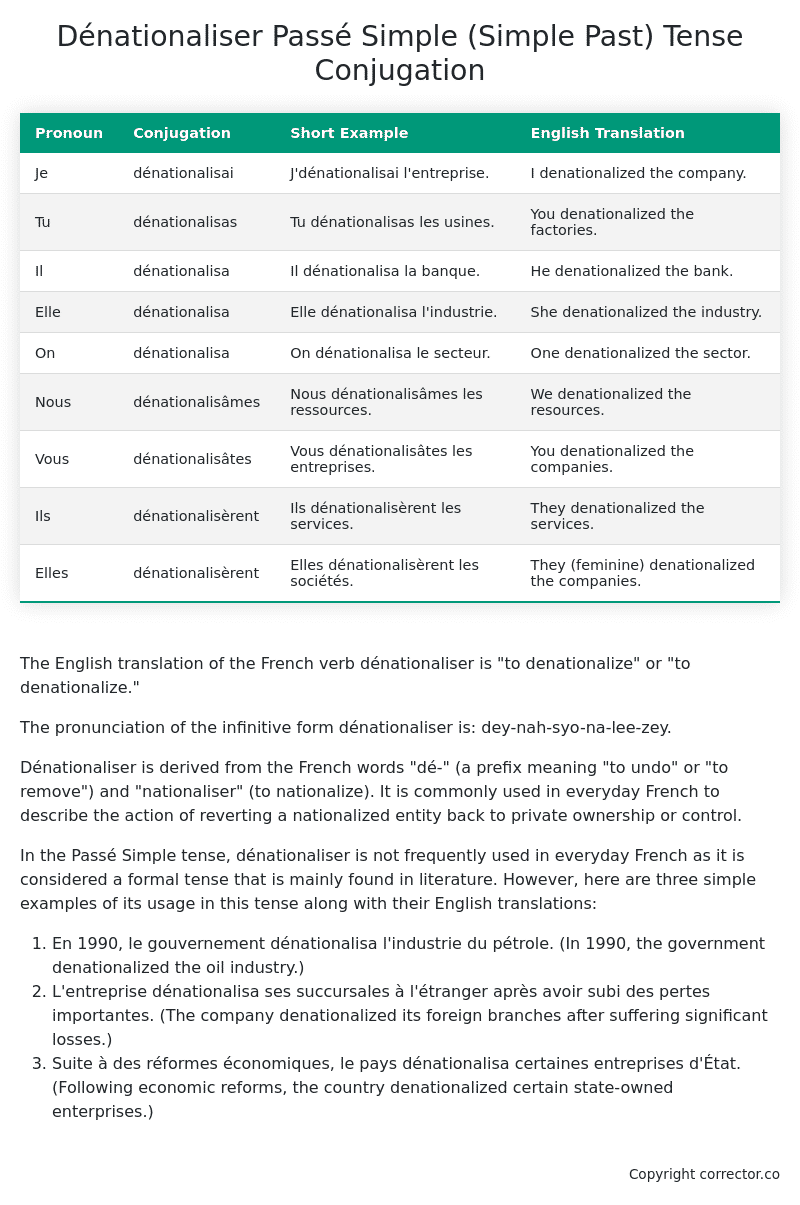Passé Simple (Simple Past) Tense Conjugation of the French Verb dénationaliser
Introduction to the verb dénationaliser
The English translation of the French verb dénationaliser is “to denationalize” or “to denationalize.”
The pronunciation of the infinitive form dénationaliser is: dey-nah-syo-na-lee-zey.
Dénationaliser is derived from the French words “dé-” (a prefix meaning “to undo” or “to remove”) and “nationaliser” (to nationalize). It is commonly used in everyday French to describe the action of reverting a nationalized entity back to private ownership or control.
In the Passé Simple tense, dénationaliser is not frequently used in everyday French as it is considered a formal tense that is mainly found in literature. However, here are three simple examples of its usage in this tense along with their English translations:
- En 1990, le gouvernement dénationalisa l’industrie du pétrole. (In 1990, the government denationalized the oil industry.)
- L’entreprise dénationalisa ses succursales à l’étranger après avoir subi des pertes importantes. (The company denationalized its foreign branches after suffering significant losses.)
- Suite à des réformes économiques, le pays dénationalisa certaines entreprises d’État. (Following economic reforms, the country denationalized certain state-owned enterprises.)
Table of the Passé Simple (Simple Past) Tense Conjugation of dénationaliser
| Pronoun | Conjugation | Short Example | English Translation |
|---|---|---|---|
| Je | dénationalisai | J’dénationalisai l’entreprise. | I denationalized the company. |
| Tu | dénationalisas | Tu dénationalisas les usines. | You denationalized the factories. |
| Il | dénationalisa | Il dénationalisa la banque. | He denationalized the bank. |
| Elle | dénationalisa | Elle dénationalisa l’industrie. | She denationalized the industry. |
| On | dénationalisa | On dénationalisa le secteur. | One denationalized the sector. |
| Nous | dénationalisâmes | Nous dénationalisâmes les ressources. | We denationalized the resources. |
| Vous | dénationalisâtes | Vous dénationalisâtes les entreprises. | You denationalized the companies. |
| Ils | dénationalisèrent | Ils dénationalisèrent les services. | They denationalized the services. |
| Elles | dénationalisèrent | Elles dénationalisèrent les sociétés. | They (feminine) denationalized the companies. |
Other Conjugations for Dénationaliser.
Le Present (Present Tense) Conjugation of the French Verb dénationaliser
Imparfait (Imperfect) Tense Conjugation of the French Verb dénationaliser
Passé Simple (Simple Past) Tense Conjugation of the French Verb dénationaliser (You’re reading it right now!)
Passé Composé (Present Perfect) Tense Conjugation of the French Verb dénationaliser
Futur Simple (Simple Future) Tense Conjugation of the French Verb dénationaliser
Futur Proche (Near Future) Tense Conjugation of the French Verb dénationaliser
Plus-que-parfait (Pluperfect) Tense Conjugation of the French Verb dénationaliser
Passé Antérieur (Past Anterior) Tense Conjugation of the French Verb dénationaliser
Futur Antérieur (Future Anterior) Tense Conjugation of the French Verb dénationaliser
Subjonctif Présent (Subjunctive Present) Tense Conjugation of the French Verb dénationaliser
Subjonctif Passé (Subjunctive Past) Tense Conjugation of the French Verb dénationaliser
Subjonctif Imparfait (Subjunctive Imperfect) Tense Conjugation of the French Verb dénationaliser
Conditionnel Présent (Conditional Present) Tense Conjugation of the French Verb dénationaliser
Conditionnel Passé (Conditional Past) Tense Conjugation of the French Verb dénationaliser
Conditionnel Passé II (Conditional Past II) Tense Conjugation of the French Verb dénationaliser
L’impératif Présent (Imperative Present) Tense Conjugation of the French Verb dénationaliser
L’impératif Passé (Imperative Past) Tense Conjugation of the French Verb dénationaliser
L’infinitif Présent (Infinitive Present) Tense Conjugation of the French Verb dénationaliser
L’infinitif Passé (Infinitive Past) Tense Conjugation of the French Verb dénationaliser
Le Participe Présent (Present Participle) Tense Conjugation of the French Verb dénationaliser
Le Participe Passé (Past Participle) Tense Conjugation of the French Verb dénationaliser
Struggling with French verbs or the language in general? Why not use our free French Grammar Checker – no registration required!
Get a FREE Download Study Sheet of this Conjugation 🔥
Simply right click the image below, click “save image” and get your free reference for the dénationaliser Passé Simple tense conjugation!

Dénationaliser – About the French Passé Simple (Simple Past) Tense
Formation
Usage
Narration
Historical Context
Interactions with other tenses
Passé Composé
Imparfait
Conditional and Subjunctive
Summary
I hope you enjoyed this article on the verb dénationaliser. Still in a learning mood? Check out another TOTALLY random French verb conjugation!


